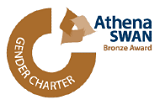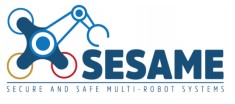
University of York leads €7M European R&D Project Investing in Platform for Developing Safe and Reliable Multi-Robot Systems
Posted on 1 April 2021

The project will provide advanced software design and deployment capabilities that handle the uncertainty, variability, and interplay of safety and security assurance challenges posed by Multi-Robot Systems (MRS). The SESAME project is investing €7 million to develop an open, modular, configurable platform for systematic engineering of dependable MRS.
The advanced development and deployment technologies will enable a new generation of MRS to deliver solutions for key European sectors including Healthcare, Manufacturing, Agri-food, and Infrastructure Inspection, where groups of interconnected robots are better able to carry out critical tasks such as disinfecting hospitals, managing farms and crops, rapidly adapting production lines to new products, and maintaining energy transmission facilities.
The University of York will be involved in the development of the new SESAME platform and will devise techniques for simulation-based testing and quality assessment of Machine Learning to make robotic systems more robust and resilient. The SESAME project is timely and aligns closely with the UK Government’s key research agenda on increasing the trustworthiness of robotics systems used in safety-critical applications. The project extends existing university-wide research initiatives and leadership activities on assuring the safety of robotics and connected autonomous systems, thus contributing to the University’s research strategy on realising the full potential of robotics and having a positive impact on society and the economy.
The University of York team comprises Dr Nicholas Matragkas (Lecturer in Computer Science), Dr Simos Gerasimou (Lecturer in Computer Science), Professor Dimitris Kolovos, (Professor of Software Engineering) and two post-doctoral researchers, all hosted in the Department of Computer Science.
The SESAME technologies will focus on addressing key aspects of MRS including emergent behaviour, uncertainties in the operating environments, security threats and safety, heterarchy of systems, variability of robotic hardware platforms and tailorability. Key technological advances being developed in the project include:
- Simplifying MRS configurations by using new languages that hide the complexity and intricacies of robotic platforms
- Machine learning of MRS tasks and scenarios that are adaptable and reusable to exploit past knowledge and experience for subsequent tasks
- Advanced automation of effective safety and security analysis during MRS design providing substantial savings in time and costs
- Novel forms of safety and security assurance that uses advanced run-time monitoring capabilities
- Seamless configuration and reconfiguration at design and run-time enabling MRS to be rapidly adapted for different applications and scenarios.
The innovative framework will be extensively validated through five industrial pilots addressing MRS for Healthcare, Manufacturing, Agri-food, and Infrastructure Inspection. The resulting platform will be made available in open source.
“The SESAME project introduces a new, disruptive view on quality assurance of MRS functioning in dynamic and uncertain environments” said Dr Nicholas Matragkas, SESAME Technical Co-Director. “Through the novel concepts of Executable Scenarios and Executable Digital Dependability Identities, SESAME will move parts of safety and security analysis at runtime and enable MRS to cope with a wider range of disruptive changes than currently possible” continued Dr Matragkas.
Coordinated by The Open Group and under the Technical Direction of University of York, the SESAME consortium includes leading universities and research institutes: ATB, BonnRhein-Sieg University, FORTH, Fraunhofer, KIOS, University of Hull and University of Luxembourg; leading robotics manufacturers and technology providers: KUKA, Locomotec and TTS; and industrial, agricultural and government organisations that rely on robotic systems: Aero41, Domaine Kox, Luxsense, AVL, and Cyprus Civil Defence Agency. Partners are based in Austria, Cyprus, Germany, Greece, Italy, Luxembourg, Switzerland, and the United Kingdom.
“The SESAME consortium, with its unique expertise on robotics, Artificial Intelligence, model-based safety, security analysis, validation and verification, will push the boundaries of dependable development of MRS applications” said Dr Simos Gerasimou, SESAME Technical Co-Director. “The SESAME platform will support the systematic engineering of dependable MRS applications spanning the entire lifecycle of an MRS, including both design-time and runtime, thus lowering the entry barrier and costs for European companies and organisations to develop robust and scalable MRS” highlighted by Dr Gerasimou.
The SESAME project is financed in part by the Horizon 2020 Framework Programme, an initiative of the European Community created to foster European research and development of new technologies, applications and industries. The SESAME project will run through the end of 2023.
Find out more about the project.
